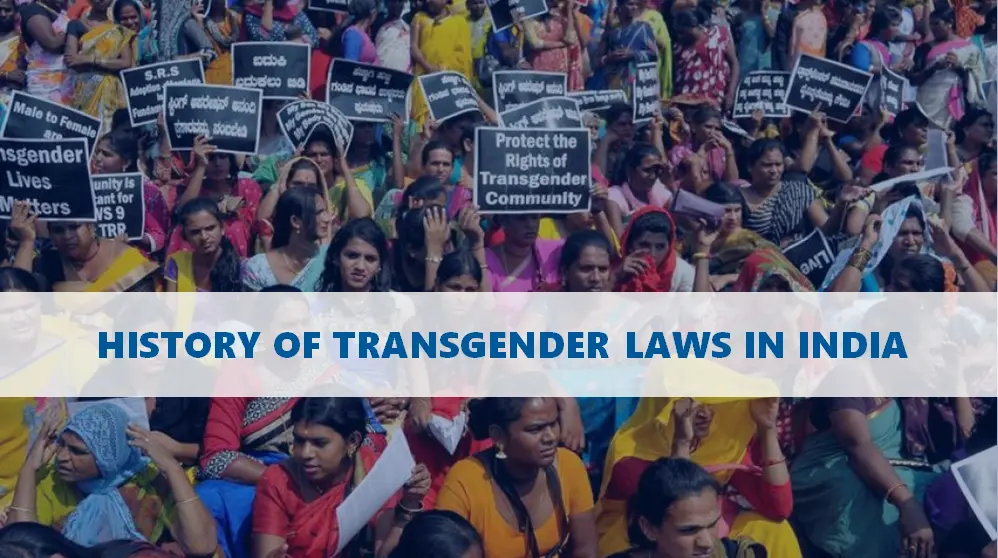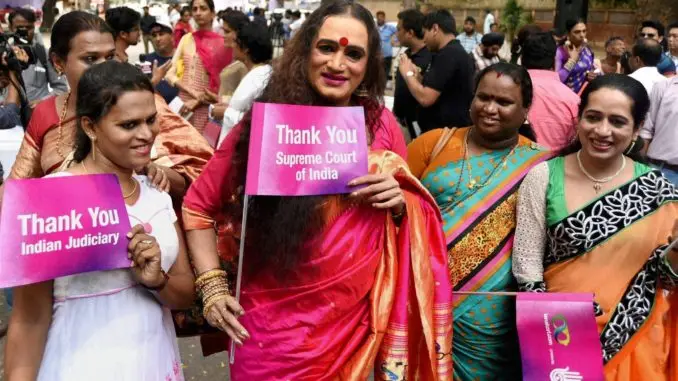Home » Background of Laws on The Transgender Persons in India

Mainly, we know about only two genders in our society, one is male and other is female but there is third gender also exist that is transgender. We didn’t even recognise them properly. The transgender persons are facing many problems every day in our civilised society. They are different, their gender identity is different from us and because of that, their rights are more important.
The transgender persons belong to vulnerable group. Many transgender persons face targeted physical attack, they are beaten, sexually abused and discrimination is done by many people on the basis of their gender.
Transgender person’s definition is given under section 2(k) of the Transgender Persons (Protection of Rights) Act 2019. In accordance with section 2(k) of that act “transgender person” means a person whose gender does not match with the gender assigned to that person at birth and includes trans-man or trans-woman (whether or not such person has undergone sex reassignment surgery or hormone therapy or laser therapy or such other therapy), person with intersex variations, gender queer and person having such socio-cultural identities as Kinner, Hijra, Aravani and Jogta.
The history of transgender person is as old as history of human. We listened about them since the Ramayana and the Mahabharata era. Sanskrit language has also Napunsak ling. In Mughal’s era, transgender provides security for the queen and they had got respect. In Bruisers rule, they recognise transgender person as a criminal tribe and spread myth about them in The Criminal Tribes Act 1871. After the freedom of the India this act has been repealed by the parliament.
After the freedom, government did not pay attention to them and after decades of freedom the Supreme Court of India given recognition to transgender persons in 2014.
In this case, Supreme Court given recognition for transgender persons as the third gender affirming that the fundamental right granted under the constitution of India shall be equally applicable to them and gave right to self-identification of their as male or third gender.
Supreme Court of India also held that the transgender persons are also human being and they have all the rights which are given by the Constitution of India. They have right to life and personal liberty, right to privacy, right to equality, freedom of speech and expression and all other right which is given for every citizen of India.
Transgender persons also have all human rights under the universal declaration of human right 1948. This judgement gave new hope for the transgender community who have suffered and faced discrimination and social Injustice.

Learn More: Fundamental Duties of Indian Citizens
Section 377 of Indian penal code criminalized sex between homosexual and because of that transgender person were be punished for sexual relation.
It is a landmark judgement of the Delhi high court. In this case court held that homosexual sex between adults is not a crime and section 377 violate fundamental rights of persons. Because of that reason, section 377 Of Indian penal code is unconstitutional. After this verdict, an appeal is filed against the judgment of Delhi High Court in Supreme Court.
In this appeal, Supreme Court two judges bench overruled the judgement of High Court and held that section 377 of Indian penal code is valid and constitutional.
After this judgement of Supreme Court, a fresh petition is filed in Supreme Court.
In this writ petition, Supreme Court five Judges constitutional bench decriminalized homosexuality but rest of part of section 377 of Indian penal code relating to sex with minor or non-consensual sexual act remain in force.
In the year of 2019, Parliament of India has passed an act the Transgender Persons (Protection of Right) Act 2019 .
Under section 2 (k), definition of transgender person has been provisioned. This act provides rights for transgender persons. Section 3 of this act deal with discrimination against transgender on the basis of their sex and section 4 gives recognition to transgender person and they have right to self-perceived gender identity.
Under Section 18 of this act, punishment has been also given. whoever complies or entices a transgender person to indulge in act of forced or bonded labour or forces or causes a transgender person to leave household, village or other place or residence or harms or injures or endanger the life, safety, health or well-being, weather mental or physical or tends to do physical abuse, sexual abuse, verbal and emotional abuse and economic abuse or denies a transgender person the rights of passage to a public place it shall be punishable with imprisonment for a term which shall not be less than six month but which may extend to two years and with fine. This act also imposes duty on the government to secure rights of transgender persons.
The background of laws on transgender is too old. Some goals have achieved and some are remains but in present time, the attitude of society is changing for transgender person but till now they are weaker section so some necessary step should be taken by the government for enhance the rights of the transgender persons.
Learn More: Health Laws in India
From
Durgendra Singh Rajpoot
Assistant Professor
School of Law
Lingaya’s Vidyapeeth
Best LLM College in Delhi NCR
RECENT POSTS
CATEGORIES
TAGS
Agriculture Agriculture future AI Architecture artificial intelligence BA English BA Psychology BTech CSE BTech Engineering Business management career Career-Specific Education career guide Career Opportunities career option career scope Civil engineering commerce and management Computer Science Computer science engineering Data science degree education Engineering Engineering students English Literature english program Exam tips Fashion Design Fashion design course Higher Education Journalism journalism and mass communication law Law career Machine Learning MA Psychology Master degree mathematics MBA Mechanical Engineering Pharmacy Psychology Research and Development students
University Address: Nachauli, Jasana Road, Faridabad, Haryana
Toll Free: 1800-120-4613
Mobile : 8447744303 | 8447744304 | 8447744306 | 8447744309
Address: C-72, Second Floor, Shivalik, Near Malviya Nagar,
Above HDFC Bank, New Delhi 110017
Ph.No. - 011-46570515 / 45138169 / 41755703 / +91-7303152412
Jagmani Kutir, Ground Floor, Road No-1, Rajeev Nagar,
Near Darbar Marriage Hall, Patna-800024, Bihar
Contact No: 9818352069/8130120095
Mail: [email protected]
Copyrights © 1998 - 2025 Lingaya's Vidyapeeth (Deemed To Be University). All rights reserved.
It is important to note that the following email IDs and domains are fraudulent and do not belong to our university.
LV only conducts physical/online verification of any document related to examination on the following email id: